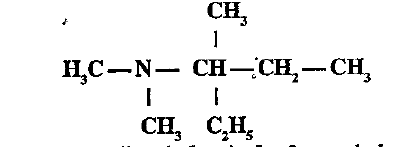Which of the following is an electro-phile: H2O,BF3,NH3?Solution in Odia
Step by step video & image solution for Which of the following is an electro-phile: H_2O, BF_3, NH_3? by Chemistry experts to help you in doubts & scoring excellent marks in Class 12 exams.
Updated on:21/07/2023Topper's Solved these Questions
- ORGANIC CHEMISTRY : SOME BASIC PRINCIPLES AND TECHNIQUESBOOK - MBD PUBLICATIONCHAPTER - ORGANIC CHEMISTRY : SOME BASIC PRINCIPLES AND TECHNIQUESEXERCISE - QUESTION TYPE
262 Videos
- ORGANIC COMPOUNDS CONTAINING NITROGENBOOK - MBD PUBLICATIONCHAPTER - ORGANIC COMPOUNDS CONTAINING NITROGENEXERCISE - QUESTION BANK
314 Videos
Similar Questions
Which of the following compounds has isopropyl group
View SolutionWrite the IUPAC name of following compound.

View SolutionWhich of the following can behave as an ambident nucleo-phile?
View SolutionWhich of the following are Lewis acids? H_2O, BF_3, H^+ and NH_4^+
View SolutionWhich one of each of the following pairs is expected have the larger bond angle ?
(1) H2OandNH3 (2) SF2andBeF2
(3) BF3andBF−4 (4) PH3andNH3
(5) NH3andNF3
View SolutionWhich of the following are lewis acids? H_2O,BF_3,H^+ and NH_4^+
View SolutionWhich of the following are Lewis acids ? H_2O , BF_3 ,H^+ and NH_3
View SolutionWhich of the following are Lewis acids ? H_2O, BF_3 , H^(+) , CN^(-) , CO_2
View SolutionWhich of the following compounds are irreversible - H_2O , BF_3, CHCl_3 , HSO_4^(-) , NH_4^(+) , C_6H_6
View SolutionWhich of the following members are amphoteric - NH_4^(+) , H_2O , H_2O , H_3O^(+) , HSO_4^(-) , BF_3
View SolutionClassify the following into Lewis acids or Lewis bases giving reasons : H_2O, BF_3, NH_3, SiF_4, Ag^+, CI^-, CO_2 .
View SolutionWhich of the followings are Lewis acids ? H_2O , BF_3 , H^+ and NH_4^+
View SolutionWhich of the followings are Lewis acids ? H_2O, BF_3 , H^(+) , NH_4^(+)
View SolutionBF_3 and NH_3 are ….. In the reaction BF_3+NH_3 to BF_3 larr NH_3 .
View SolutionWhich of the following is the correct order of bond angle in H_2S , NH_3 , BF_3 and SiH_4 ?
View Solution
